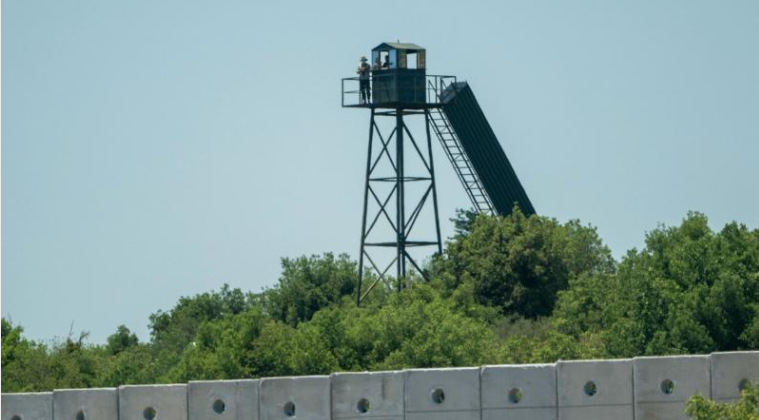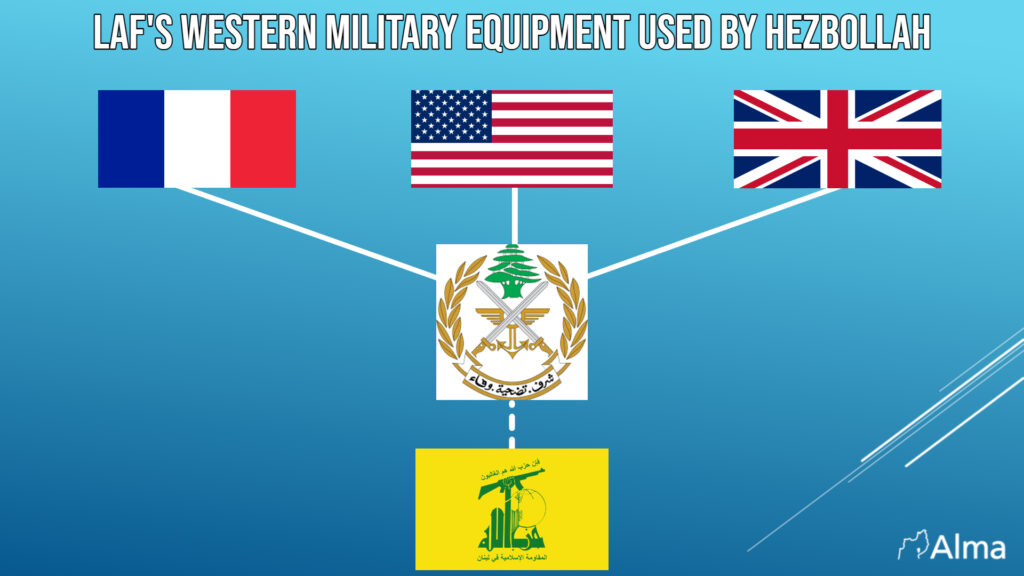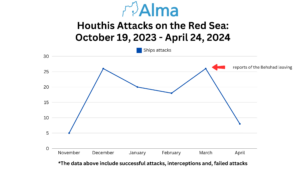By: Dana Polak Kanarik
As part of the diplomatic efforts to de-escalate the conflict across the Lebanese-Israeli border the French outline was offered to Israel and Hezbollah. The settlement includes a mutual cease-fire, the withdrawal of Hezbollah forces 10 kilometers from the border, the deployment of around 15,000 Lebanese army soldiers near the southern border, and the commencement of land-border negotiations. Similar to UN Security Council Resolution 1701, which was enacted at the end of the Second Lebanon War, the Lebanese army bears the “responsibility” for putting the framework into operation. The reliance on the Lebanese army and the expectation that it will enforce the outline in practice are based on false hopes and contradict the facts on the ground.
Since 2006, Hezbollah has openly and consistently violated the terms agreed upon in Resolution 1701, as well as UN Security Council Resolution 1559, which called for the dismantling of all military militias in Lebanon. The Lebanese army, with UNIFIL’s assistance, is the entity required to enforce the security arrangements established and prevent Hezbollah from violating the resolution. In practice, however, Hezbollah’s activity in southern Lebanon is carried out with the Lebanese army’s turning a blind eye and even cooperating.
The Forward-Looking Narrative
According to Hassan Nasrallah, the Lebanese army is a partner and pillar in the equation of “the army, the people and the resistance.” This equation is a perception narrative that legitimizes Hezbollah to keep its weapons, to act against Israel alongside the Lebanese army, and even makes it possible to expand the scope of its permitted activities under the pretext of defending Lebanon. We assume this narrative “prepares the ground” for Hezbollah’s intentions to take over the Lebanese army merging it into Hezbollah. Hezbollah has admitted in the past that its operatives fought alongside the Lebanese army as part of the struggle against ISIS and al-Qaeda forces on the Lebanon-Syria border (Arsal).


Hezbollah’s possession of weapons makes it difficult, if not impossible, for the Lebanese army to execute its function as the state’s sole legitimate military wing. However, Hezbollah’s unique status in Lebanon obliges it to act so that the Lebanese army remains weak and not be able to take on the role of national defense. By doing so, Hezbollah can keep claiming that it is supporting the Lebanese army against external threats. This enables Hezbollah not only to justify its possession of its weapons, in the name of its role as defender of Lebanon, but also permits it to maintain military superiority and to gradually expand its military operations and infrastructure while perceiving it as a national resistance movement against the Israeli occupation.

Demography
In recent decades, Lebanon’s demographics have changed, affecting the composition of the Lebanese army. These developments were brought about by the decrease in the proportion of Christians in the Lebanese population, as well as the rise of Shi’ites. The reduction in the percentage of Christians in Lebanon’s population is due to a variety of factors, including immigration to Western countries and a lower birth rate among Lebanese Christians. These changes have had an impact on the army’s composition, so that while Christians were once heavily represented in the army in general, and among commanders and officers in particular, Shiites now hold a strong majority.
Other causes for the reduction in Christian domination include the repeal of the Conscription Law (2007), as well as the dire economic situation and wage declines, which have greatly lowered the motivation to enlist among the Christian community. At the same time, Shi’ite recruitment into the army increased, due to both natural growth among the Lebanese population and internal changes that strengthened the Shi’ite community’s identity with the Lebanese state. These factors have resulted in strong Shiite domination in the Lebanese army. According to some of the assumptions, about 50% of the soldiers and officers of the Lebanese army are Shiites. In other words, the Lebanese army is undergoing Shi’ization.
Hezbollah’s exploitation and increasing influence over Lebanese army officers and soldiers
Hezbollah has a clear interest in the growth of Shiite personnel in the Lebanese armed forces, who are likely to support and identify with Hezbollah. Hezbollah employs a large number of officers and troops, the majority of whom are Shiites who directly or indirectly support its aims. These soldiers identify with Hezbollah for ideological, sectarian, or familial grounds (a family member is a Hezbollah member), and they support Hezbollah’s operations in southern Lebanon.
Hezbollah also trains Shiite applicants for the Lebanese army’s military academy and acts to promote them to senior positions. The Lebanese Military Academy is an institution that raises and trains cadets to join the Lebanese security forces, which include the army, internal security, public security, and customs.
The Lebanese army is one of Lebanon’s last remaining institutions that is supported by the people. The army seeks to represent a national ideal, a cohesive force that transcends sectarianism. However, the rise of Shi’ism, combined with the fall in Christian recruiting, has played an important role in strengthening the Lebanese army’s links with Hezbollah.
Hezbollah’s exploitation of military infrastructure and equipment
Hezbollah systematically recruits Lebanese army commanders. Through them, it can employ infrastructure and military resources to coordinate activities or incorporate undercover into Lebanese army patrols. For example, in recent years, Hezbollah has built military surveillance towers along the border with Israel under the pretense of a “green without borders” environmental organization, completely ignoring the Lebanese army. In addition, we noticed Hezbollah using the Lebanese army’s observation towers.

Furthermore, Hezbollah’s infiltration into the ranks of the Lebanese army gives it access to Western weaponry and technology. Hezbollah gained access to security radars at Beirut International Airport and the Lebanese Navy in June 2023, thanks to the cooperation of Lebanese army officers. Some of the equipment that Hezbollah obtained illegally was provided by the United States and other Western countries. This raised concerns of leakage of weapons and expertise that Hezbollah can use in its confrontation with Israel.

Exploitation of influence in Lebanese state institutions in general and military institutions in particular
For years, Hezbollah has used Lebanese state institutions to expand and preserve its dominance. In this way, Hezbollah controls some Lebanese army institutions, such as military tribunals and intelligence, via Shiite officers stationed there. Furthermore, Hezbollah’s political clout in the Lebanese government enables the group’s leadership to advocate for a specific military assignment – particularly in the southern suburb of Beirut, the south of the country, and the Bekaa Valley – that will facilitate Hezbollah’s military activities.
Also, Hezbollah infiltrated to the governmental security system, which is also under its control. Previously, the role of chief of general security was designated to a Maronite Christian, but Hezbollah successfully petitioned to have it moved to a Shiite. Hezbollah relies heavily on general security intelligence, as well as counterintelligence to prevent spy infiltration. This is another example of Hezbollah taking control of Lebanon’s official institutions.
The Economic Distress of the Lebanese Army
Given Lebanon’s economic difficulties, the army is becoming increasingly reliant on international economic aid. Countries such as the United States, Qatar, Germany, and others donate millions of dollars in economic aid to the Lebanese army, to help him keep function. The army not only struggles to fund logistical equipment for its operations, but it also relies on external donations for food and troops’ salaries. In this manner, the United States provides salaries to Lebanese army forces while Qatar aids with food deliveries to its soldiers. According to Lebanese Defense Minister Morris Salim recent announcement (Feb 28), Lebanese army men are unprepared for battle because of their inadequate pay. Soldiers are required to work on their vacations to help support their families.
The economic hardship of Lebanese army soldiers provides Hezbollah with a window of opportunity and an extra lever of power. Through “financial assistance,” Hezbollah can manipulate soldiers and officers for its own personal gain. Furthermore, this “economic aid” may be effective in attracting non-Shiite officers and soldiers to its cause. Hezbollah can appeal to all soldiers from diverse communities who are in a dire economic situations by offering “economic assistance” and receiving benefits in return.
Summary
Western policy continues to support the perception that the Lebanese army must be strengthened, based on the belief that the army is the only legitimate protector of Lebanese sovereignty. This is likewise the strategy used in the French outline for de-escalating the conflict between Israel and Hezbollah. However, this outline ignores the failure of earlier and similar resolutions that aimed to establish a new reality in southern Lebanon, in which the Lebanese army will be the Lebanon’s sole and sovereign armed force.
In practice, the reality is different. The Lebanese army has a limited function, primarily in southern Lebanon, and is not a powerful institute capable of establishing Lebanese sovereignty, enforcing political frameworks and agreements, or acting as a counterweight to Hezbollah. We estimate that it is only a matter of time before the Lebanese army becomes a Hezbollah protégé or fully integrating with the his forces.
Sources
“Hezbollah exploits Lebanese army soldiers as human shields and collaborators”, 07.12.2023, Alma Research and Education Center, https://israel-alma.org/2023/12/07/hezbollah-exploits-lebanese-army-soldiers-as-human-shields-and-collaborators/
“Hezbollah utilizes Western military equipment supplied to the Lebanese Army along the border area with Israel”, 29.06.2023, Alma Research and Education Center, https://israel-alma.org/2023/06/29/hezbollah-utilizes-western-military-equipment-supplied-to-the-lebanese-army-along-the-border-area-with-israel/
“Are the Lebanese Armed Forces in danger of becoming a proxy for Hezbollah?”, 12.01.2020, Alma Research and Education Center, https://israel-alma.org/2020/01/12/are-units-in-the-laf-in-danger-of-becoming-a-proxy-of-hezbollah/
“Hezbollah’s Systematic Violation of UN Security Council Resolutions”, IDF, https://www.idf.il/en/mini-sites/hezbollah-and-lebanon-an-in-depth-examination-under-hassan-nasrallah-s-leadership/hezbollah-s-systematic-violation-of-un-security-council-resolutions/
“The Lebanese Armed Forces: Hezbollah’s Collaborator”, Yossi Mansharof, 30.10.2018, JISS, https://jiss.org.il/en/mansharof-the-lebanese-armed-forces-hezbollahs-collaborator/
“Hezbollah recruited Lebanese Army soldiers, infiltrated surveillance radars: Sources”, 26.06.2023, Al-Arabia, https://english.alarabiya.net/News/middle-east/2023/06/26/Hezbollah-recruited-Lebanese-Army-soldiers-infiltrated-surveillance-cameras-Sources
“Can the Lebanese Army Prevent a Hezbollah-Christian Conflict?”, 11.08.2023. The Washington Institute, https://www.washingtoninstitute.org/policy-analysis/can-lebanese-army-prevent-hezbollah-christian-conflict
“Lebanon: Background and U.S Relations”, 19.05.2023, Congressional Research Service, https://crsreports.congress.gov/product/pdf/R/R44759
“How Hezbollah holds sway over the Lebanese state”, 30.06.2021, Chatham House, https://www.chathamhouse.org/2021/06/how-hezbollah-holds-sway-over-lebanese-state/05-influence-over-military-and-security
“Loyalties and Group Formation in the Lebanese Officer Corps”, 03.02.2016, Carnegie Europe, https://carnegieeurope.eu/2016/02/03/loyalties-and-group-formation-in-lebanese-officer-corps-pub-62560
“Christians Are Disappearing From Lebanon”, 04.03.2015, state of mind, https://stateofmind13.com/2015/03/04/christians-are-disappearing-from-lebanon/





